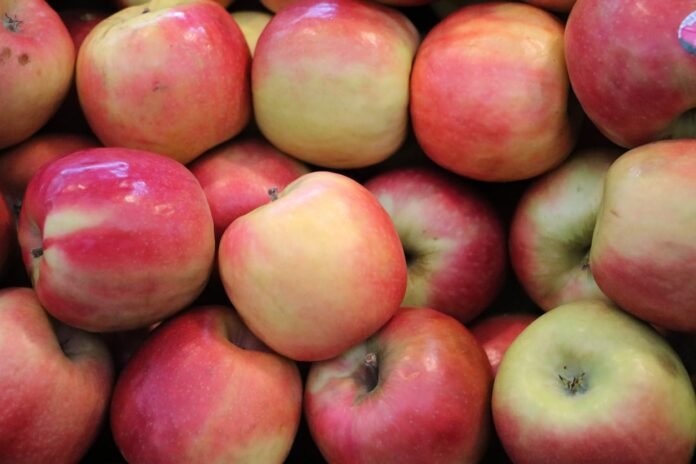The claim that eating peeled apples can improve mood and relieve pain during periods has sparked interest and discussion among health enthusiasts and individuals seeking natural remedies for menstrual discomfort. However, experts emphasize the importance of incorporating a variety of healthy lifestyle habits to support overall emotional well-being throughout the menstrual cycle.
While apples are undoubtedly a nutritious fruit rich in vitamins, minerals, and antioxidants, there is limited scientific evidence to support the specific claim that eating peeled apples can alleviate mood swings or menstrual pain. While some anecdotal reports suggest that certain foods, including apples, may have mood-boosting or pain-relieving properties, more rigorous scientific research is needed to confirm these claims definitively.
Nevertheless, maintaining a balanced and nutritious diet can play a crucial role in supporting overall health and well-being, including during menstruation. Consuming a variety of fruits, vegetables, whole grains, lean proteins, and healthy fats provides essential nutrients that support hormonal balance, energy levels, and mood regulation throughout the menstrual cycle.
In addition to dietary factors, regular physical activity, stress management techniques, and adequate sleep are essential components of a holistic approach to managing menstrual symptoms and supporting emotional well-being. Engaging in regular exercise releases endorphins, which are natural mood elevators and pain relievers, while stress management practices such as mindfulness meditation, deep breathing exercises, and relaxation techniques can help alleviate tension and promote relaxation.
Furthermore, staying hydrated by drinking plenty of water and herbal teas can help alleviate bloating and discomfort associated with menstrual cramps. Certain herbal teas, such as chamomile or ginger tea, may also have soothing properties that can provide relief from menstrual symptoms.
In recent years, there has been growing interest in the relationship between diet and menstrual health, with many individuals exploring natural remedies and dietary interventions to alleviate menstrual symptoms. While some foods, such as those rich in omega-3 fatty acids, antioxidants, and anti-inflammatory compounds, may have potential benefits for menstrual health, it is essential to approach such claims with caution and seek evidence-based information from reliable sources.
Research exploring the effects of specific foods on menstrual symptoms is ongoing, and while preliminary findings are promising, more robust studies are needed to establish clear cause-and-effect relationships. For example, studies have suggested that certain dietary factors, such as a high intake of fruits, vegetables, and whole grains, may be associated with reduced risk of experiencing severe menstrual symptoms, while diets high in refined carbohydrates, sugar, and saturated fats may exacerbate symptoms.
Apples, like many other fruits, are rich in fiber, vitamins, and antioxidants, which contribute to overall health and well-being. While there is no direct evidence linking the consumption of peeled apples to mood improvement or pain relief during periods, including apples as part of a balanced diet can provide valuable nutrients that support overall health.
Moreover, the act of peeling apples may remove some of the fruit’s fiber and antioxidant-rich skin, potentially reducing its nutritional value. Therefore, consuming whole apples, including the skin, may offer greater health benefits compared to peeled apples.
In addition to dietary factors, hormonal fluctuations throughout the menstrual cycle can influence mood, energy levels, and physical symptoms. For some individuals, certain phases of the menstrual cycle may be associated with increased vulnerability to mood swings, irritability, fatigue, and physical discomfort. Adopting lifestyle strategies that support hormonal balance and overall well-being can help mitigate these symptoms.
Regular exercise is one such strategy that has been shown to have numerous benefits for menstrual health. Engaging in moderate-intensity aerobic exercise, strength training, or yoga can help alleviate stress, improve mood, and reduce menstrual pain by promoting the release of endorphins, the body’s natural painkillers.
Furthermore, practicing relaxation techniques such as deep breathing, mindfulness meditation, or progressive muscle relaxation can help reduce stress and promote relaxation, which may help alleviate menstrual symptoms and improve overall emotional well-being.
While the claim that eating peeled apples can improve mood and relieve pain during periods may lack scientific evidence, adopting a balanced diet rich in fruits, vegetables, whole grains, and healthy fats can support overall health and well-being throughout the menstrual cycle. Incorporating lifestyle strategies such as regular exercise, stress management techniques, and adequate rest can further enhance emotional well-being and help individuals manage menstrual symptoms more effectively.

